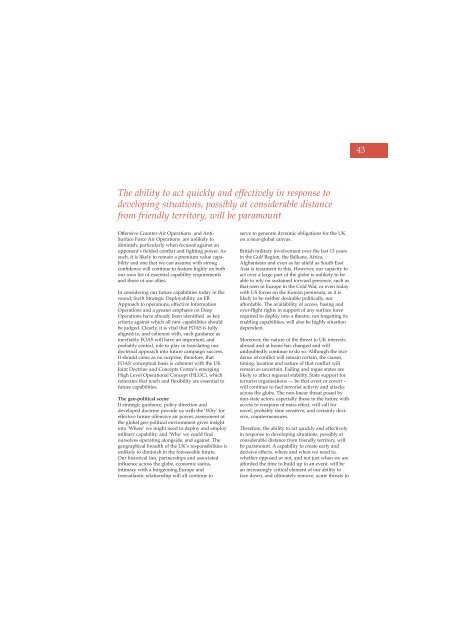Volume 6 No 4 - Royal Air Force Centre for Air Power Studies
Volume 6 No 4 - Royal Air Force Centre for Air Power Studies
Volume 6 No 4 - Royal Air Force Centre for Air Power Studies
You also want an ePaper? Increase the reach of your titles
YUMPU automatically turns print PDFs into web optimized ePapers that Google loves.
43<br />
The ability to act quickly and effectively in response to<br />
developing situations, possibly at considerable distance<br />
from friendly territory, will be paramount<br />
Offensive Counter-<strong>Air</strong> Operations and Anti-<br />
Surface <strong>Force</strong> <strong>Air</strong> Operations are unlikely to<br />
diminish, particularly when focused against an<br />
opponent’s fielded combat and fighting power. As<br />
such, it is likely to remain a premium value capability<br />
and one that we can assume with strong<br />
confidence will continue to feature highly on both<br />
our own list of essential capability requirements<br />
and those of our allies.<br />
In considering our future capabilities today in the<br />
round, Swift Strategic Deployability, an EB<br />
Approach to operations, effective In<strong>for</strong>mation<br />
Operations and a greater emphasis on Deep<br />
Operations have already been identified as key<br />
criteria against which all new capabilities should<br />
be judged. Clearly, it is vital that FOAS is fully<br />
aligned to, and coherent with, such guidance as<br />
inevitably FOAS will have an important, and<br />
probably central, role to play in translating our<br />
doctrinal approach into future campaign success.<br />
It should come as no surprise, there<strong>for</strong>e, that<br />
FOAS’ conceptual basis is coherent with the UK<br />
Joint Doctrine and Concepts <strong>Centre</strong>’s emerging<br />
High Level Operational Concept (HLOC), which<br />
reiterates that reach and flexibility are essential to<br />
future capabilities.<br />
The geo-political scene<br />
If strategic guidance, policy direction and<br />
developed doctrine provide us with the ‘Why’ <strong>for</strong><br />
effective future offensive air power, assessment of<br />
the global geo-political environment gives insight<br />
into ‘Where’ we might need to deploy and employ<br />
military capability, and ‘Who’ we could find<br />
ourselves operating alongside, and against. The<br />
geographical breadth of the UK’s responsibilities is<br />
unlikely to diminish in the <strong>for</strong>eseeable future.<br />
Our historical ties, partnerships and associated<br />
influence across the globe, economic status,<br />
intimacy with a burgeoning Europe and<br />
transatlantic relationship will all continue to<br />
serve to generate dynamic obligations <strong>for</strong> the UK<br />
on a near-global canvas.<br />
British military involvement over the last 13 years<br />
in the Gulf Region, the Balkans, Africa,<br />
Afghanistan and even as far afield as South East<br />
Asia is testament to this. However, our capacity to<br />
act over a large part of the globe is unlikely to be<br />
able to rely on sustained <strong>for</strong>ward presence, such as<br />
that seen in Europe in the Cold War, or even today<br />
with US <strong>for</strong>ces on the Korean peninsula, as it is<br />
likely to be neither desirable politically, nor<br />
af<strong>for</strong>dable. The availability of access, basing and<br />
over-flight rights in support of any surface <strong>for</strong>ce<br />
required to deploy into a theatre, not <strong>for</strong>getting its<br />
enabling capabilities, will also be highly situation<br />
dependent.<br />
Moreover, the nature of the threat to UK interests<br />
abroad and at home has changed and will<br />
undoubtedly continue to do so. Although the incidence<br />
of conflict will remain certain, the causes,<br />
timing, location and nature of that conflict will<br />
remain as uncertain. Failing and rogue states are<br />
likely to affect regional stability. State support <strong>for</strong><br />
terrorist organisations — be that overt or covert –<br />
will continue to fuel terrorist activity and attacks<br />
across the globe. The non-linear threat posed by<br />
non-state actors, especially those in the future with<br />
access to weapons of mass effect, will call <strong>for</strong><br />
novel, probably time sensitive, and certainly decisive,<br />
countermeasures.<br />
There<strong>for</strong>e, the ability to act quickly and effectively<br />
in response to developing situations, possibly at<br />
considerable distance from friendly territory, will<br />
be paramount. A capability to create early and<br />
decisive effects, where and when we need to,<br />
whether opposed or not, and not just when we are<br />
af<strong>for</strong>ded the time to build up to an event, will be<br />
an increasingly critical element of our ability to<br />
face down, and ultimately remove, acute threats to
















